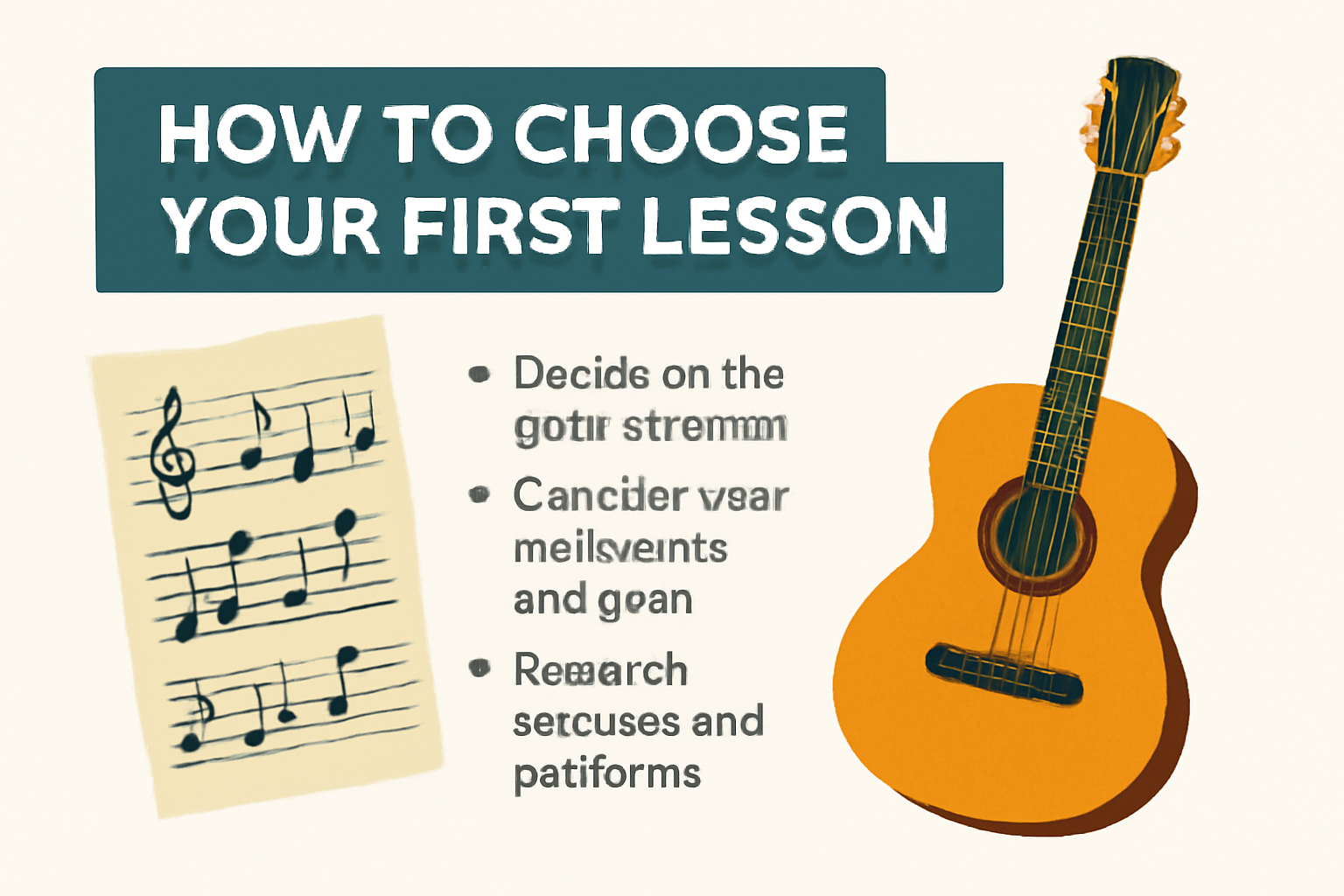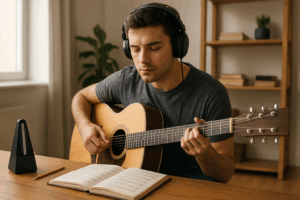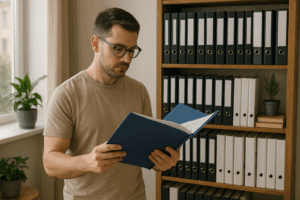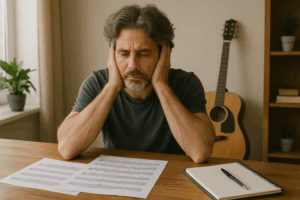Starting to learn music is an exciting decision, but many beginners often find themselves wondering where to begin. One of the first steps in your musical journey is deciding how to take your music lessons—whether you’ll study in person, online, or use a hybrid approach. Your first music lesson is a critical moment that will set the tone for your learning experience, so it’s important to make the right choice.
In this article, we’ll explore what you need to consider when choosing your first music lesson, the different types of lessons available, and tips for making the most of your early musical education.
1. Decide on the Type of Lesson: In-Person or Online
In today’s world, you have a wide range of options for music lessons, with in-person lessons and online lessons both being viable choices. Each option comes with its own advantages and considerations, and the right choice depends on your learning style, schedule, and personal preferences.
In-Person Lessons:
- Advantages: Personalized one-on-one attention, immediate feedback, and the ability to ask questions in real time. In-person lessons also provide a more structured environment and can help you stay motivated.
- Considerations: Typically more expensive than online lessons, and you may need to commute to the lesson location.
Online Lessons:
- Advantages: Greater flexibility in terms of location and scheduling. You can choose from a wide variety of teachers and platforms, often at a lower cost than in-person lessons. Online lessons also allow you to record your sessions and revisit them later.
- Considerations: It can be harder to get immediate feedback, and you’ll need to have a reliable internet connection.
How to Choose:
- If you prefer a hands-on approach with direct feedback, in-person lessons may be a good fit.
- If you have a busy schedule or prefer learning at your own pace, online lessons may be the more flexible option.
2. Consider Your Instrument and Learning Goals
The instrument you choose and your personal musical goals will have a significant impact on the type of lesson you pursue. Some instruments require more hands-on guidance, while others may be easier to learn independently through online platforms.
For Instruments Like Piano or Violin:
- These instruments often benefit from in-person lessons, especially for beginners. The teacher can help with posture, finger placement, and other nuanced aspects of technique that may be difficult to correct online.
For Instruments Like Guitar, Ukulele, or Drums:
- These instruments can be easier to start learning on your own with online lessons or self-paced tutorials, but you may still want to book in-person lessons for advanced techniques or troubleshooting.
For Vocal Lessons:
- If you are learning to sing, in-person lessons are often preferred, especially in the beginning. A teacher can help you with vocal technique, breathing, and pitch control. However, many online vocal instructors are also available for lessons via video chat.
How to Choose:
- Determine your goals: Do you want to learn the basics, or are you hoping to quickly move toward more advanced material? This will guide whether a more personalized, in-person approach or a flexible, online option is better.
3. Research Teachers and Platforms
Once you decide between in-person and online lessons, the next step is finding the right teacher or platform. Whether you’re searching locally for in-person teachers or exploring online platforms, the teacher or system you choose will shape your learning experience.
Finding a Teacher:
- In-Person: Ask for recommendations from friends, family, or local musicians. You can also search for qualified teachers in your area or visit music stores that offer private lessons.
- Online: There are many platforms that offer online lessons, such as TakeLessons, Lessonface, and Preply. Look for teachers with good reviews and check their qualifications.
Things to Consider:
- Experience and Qualifications: Look for a teacher who has experience teaching beginners and the necessary qualifications or credentials in music. For example, if you’re learning an instrument, you may want a teacher who holds a degree in music performance or education.
- Teaching Style: Every teacher has a different approach. Some may focus on theory, while others prioritize technique or performance. Try to find a teacher whose teaching style aligns with your learning goals.
- Reviews and Testimonials: Online platforms and local teachers often have reviews from previous students. Take the time to read these reviews to gauge the teacher’s effectiveness.
How to Choose:
- Look for a teacher who makes you feel comfortable, has experience in teaching beginners, and offers a teaching approach that resonates with your learning style.
4. Set Realistic Expectations for Your First Lesson
Your first music lesson is a great opportunity to introduce yourself to the basics of your instrument, musical theory, and technique. It’s important to approach your first lesson with realistic expectations. Remember, learning music takes time, and it’s a gradual process.
What to Expect:
- Instrument Setup: If you’re new to an instrument, the first lesson may involve setting up your instrument, understanding how to hold it, and learning some basic maintenance.
- Learning Basic Theory: For beginners, teachers often start with music theory fundamentals—learning how to read notes, rhythms, and the basic components of music.
- Simple Songs or Exercises: Don’t expect to play a full song on your first lesson. Instead, your instructor will likely start you with simple exercises to build your technique and comfort with the instrument.
How to Prepare:
- Before your first lesson, take some time to familiarize yourself with the instrument and basic music terminology. If you’re taking online lessons, you may also want to set up your device to ensure that you have a stable internet connection.
5. Stay Open to Feedback and Progress Gradually
Music is a skill that requires constant improvement, and it’s important to stay open to feedback from your teacher. Whether you’re learning online or in person, constructive criticism will help you improve, and being receptive to it is crucial for your progress.
How to Receive Feedback:
- Take notes during your lesson, especially on areas that need improvement.
- Don’t be discouraged by mistakes—music is all about trial and error. Embrace feedback as an opportunity to improve.
- Practice regularly between lessons to reinforce the concepts you’ve learned.
How to Track Progress:
- Keep a log of your lessons, noting the techniques or pieces you’ve learned.
- Set small goals for yourself and work on them between lessons. Celebrate your achievements, even if they’re small.
6. Be Patient and Consistent
One of the most important things to keep in mind when starting music lessons is that learning takes time. There will be times when progress feels slow, but consistency is key. Make music a part of your regular routine, and keep practicing, even when it feels challenging.
How to Stay Consistent:
- Set aside a specific time each day or week to practice.
- Break your practice into small, manageable chunks to avoid feeling overwhelmed.
- If you’re learning online, try to maintain a regular schedule for lessons to ensure you stay on track.
Patience and consistency will help you build the skills you need to become a proficient musician over time.
Choosing your first music lesson is an exciting step on your musical journey. By carefully considering your instrument, lesson format, teacher, and expectations, you can ensure that you start off on the right foot. Whether you choose in-person lessons or online sessions, remember that learning music is a gradual process that requires time, patience, and regular practice.
No matter your age or background, music is a skill that can bring joy and fulfillment to your life. Enjoy the process, stay motivated, and look forward to the incredible growth that comes with each lesson.




